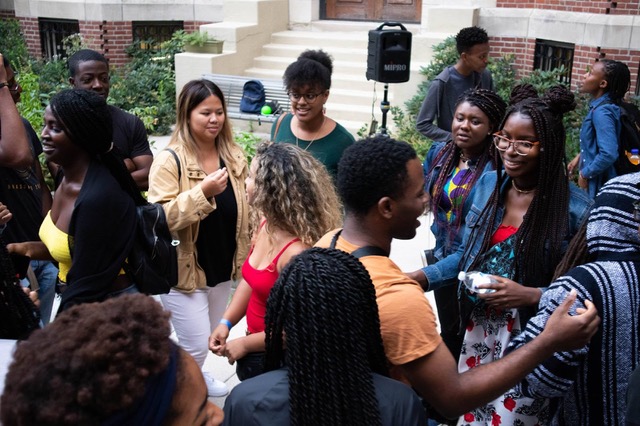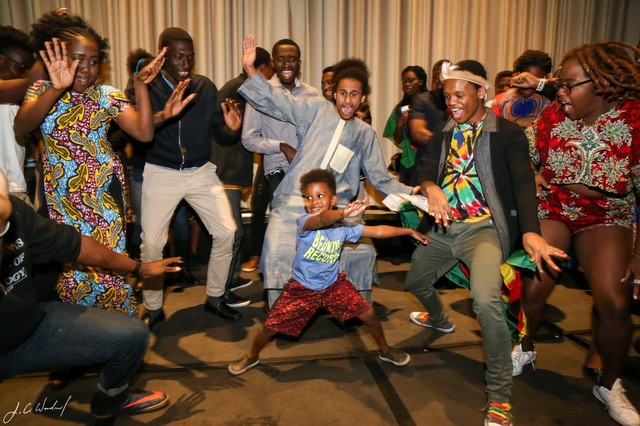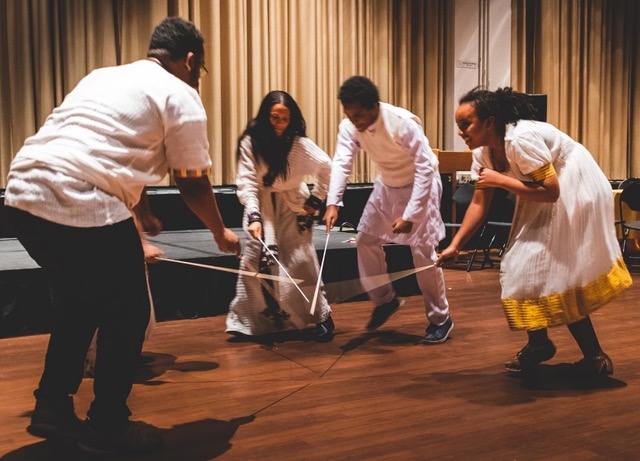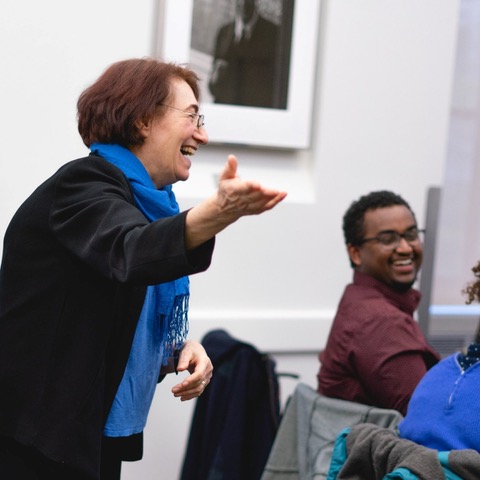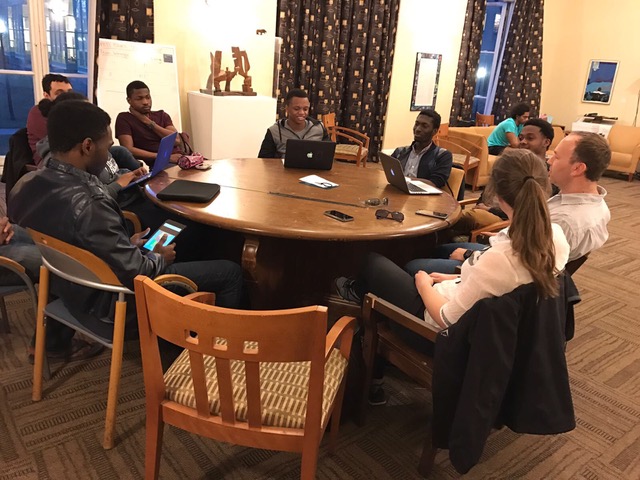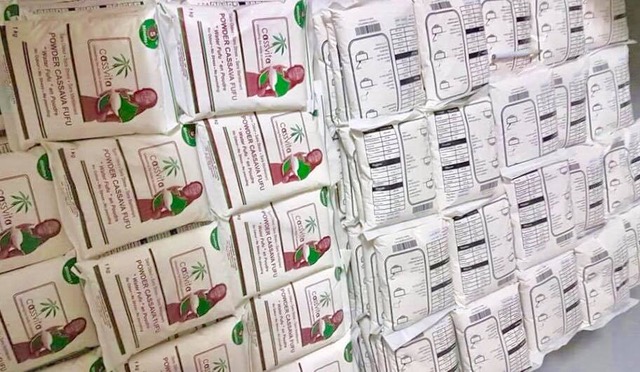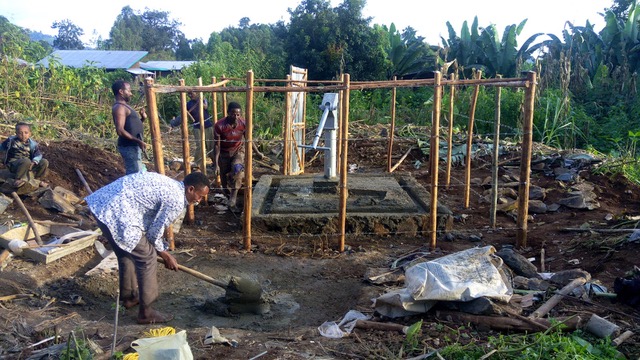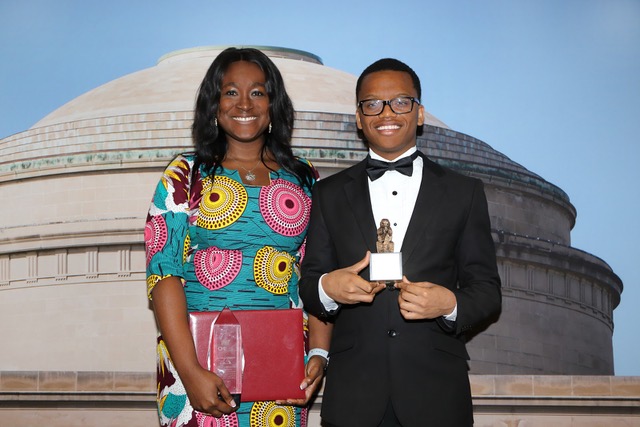A warm September evening in fall. Kudzaishe Zharare, from Harare, Zimbabwe, is the president of the MIT African Students’ Association. He has spent the day welcoming students from various African countries at Boston Logan airport. It is International Student Orientation week. All incoming students are nervous when they first step on campus, but perhaps few more so than international students, furthest from home and facing life in a new country. Fortunately, there to greet them are a contingent of current international students who have been through part of MIT already.
Gathered together for a welcome dinner, freshmen, current members, and even some alumni talk and greet the incoming international students. The people seated around the table all have slightly different backgrounds. Some international students grew up on the African continent, but went to high school abroad, in the US or the UK. Many come from cities, important capitals like Nairobi, Lagos, or Addis Ababa, and others from more rural and less resourced areas.
There are current members who are first-generation, born and raised entirely in the United States, but with immigrant parents from various African countries. There are students who first started in the US at other colleges, and later transferred to MIT. A few members have no African background—this is never a requirement—but come for the conversation, to get exposed to new ideas and perspectives, to learn (or sometimes, unlearn) history.
Toward the end of the evening Kudzaishe gathers current members so they can speak about their experiences, and invites the freshmen to ask questions. This is the core of what the MIT African Students’ Association, or ASA, represents—it is first and foremost one of the many vitally important MIT student communities, a place where students can find a home and a support network amidst the chaos of college. But the MIT ASA is also a microcosm of a continent, home to some of its brightest scholars and engineers. It is where conversations about innovation, politics, entrepreneurship, ethics and much more will take place. Some of these conversations will blossom, carrying beyond MIT, following graduates back to their home countries and communities, changing societies in vitally important ways.
A Community First
Welcoming incoming students is just one of many ways the African Students’ Association creates community on campus. Others include group dinners, study breaks, and cultural celebrations, like this past year’s 21st annual ASA cultural night themed Kijiji. In Swahili, kijiji means “village”, and the theme of the event was an African village. A tagline from MIT ASA’s Facebook page promoting the event reads, “the truth about Africa, by Africans”, reflecting a desire to dispel negative and false stereotypes, while celebrating in their own way.
Freshmen are involved from the beginning in planning events like Kijiji, and learning about the club structure to keep it alive. Of course, all those once welcomed to campus become seniors and graduate, carrying on the inevitable cycle of college life. The last ASA community event they will participate in as undergraduates is Senior Night, a celebration of their accomplishments and their contributions to the community.
Always, a speech is given by biology Professor Hazel Sive, who hails from South Africa and founded the MIT-Africa Initiative.“I can say it in this room, we have the best continent,” she said in her 2018 speech, to laughs from the students. “The best plants and animals, the best culture, the best food—and the best people. You can contribute to Africa’s future wherever you go, whether it is back in a home country, or here, advocating with our network of African alumni.”
Creating Africa’s Future
Victor Sindato, from Dar es Salaam, Tanzania sends an email each week listing the upcoming Africa Learning Circle (ALC) topics. As the current ALC chair, he begins and signs off with something inspirational:“Hello Afrofuturists,” begins one email, “Today, as we begin our history series, we take a deep dive into the story of migration; all the way from the great Bantu migration…” After a description of the topic, time, and place for the meeting, he signs off with “Pamoja”, a Swahili word meaning “together” or “unity”.
Africa Learning Circle
The ALC meetings introduce students to the practice of thinking critically and constantly about African history, technology, politics, innovation—any and all pressing issues facing the continent. “We created ALC to be the Timbuktu of the greater Boston Area—a one-stop shop to study the African continent’s past to better understand its present with the goal of shaping its future” comments Hassan Kané, ASA’s 2016-17 Vice President.
ALC covers a broad range of general topics, noted in the subject lines of Victor’s emails. “Savannahs, Valleys, Mountains, and Technology!” was a discussion about how technology hubs, the equivalents of “Silicon Valley” in different African countries, came to be, like the “Silicon Savannah” in Kenya or the “Silicon Mountain” in Cameroon. “Epidemics, 2.5 Billion, and Citizen Solutions” covered disease outbreaks, and the modern ways African countries respond to them. Some meetings screen documentaries, or provide a platform for current students to present their work—where they take ALC discussions outside of the classroom.
One such example of a student project is a startup founded by Pelkins Ajanoh, of Limbe, Cameroon, in his senior year at MIT. After initially attending University of Texas at Arlington, Pelkins transferred to MIT his sophomore year. He became the 2017-18 president of the MIT ASA, and was energized to solve problems in his home country. He explored a variety of topics and intensively researched Cameroon’s most important issues, reading papers written by experts at home and abroad. Upon discovering a recurring theme of agriculture, and the key, underutilized crop Cassava, Pelkins set out to try to transform Cameroon’s food industry.
Purposeful Projects
A year and a half later, Cassvita is a startup operating in Cameroon which processes Cassava for local use, so people can use this indigenous crop to its full capacity. What’s more, MIT undergraduates interned at Cassvita over the summer, enabling current students to learn the challenges and operations of a startup on the African continent. Pelkins sees the venture as not only a business, but first and foremost an avenue for sustainable change. “I cannot think of a better way to live my life than to give back to my community,” he says, “it’s not that you owe anyone, you just have a responsibility.”
This sense of responsibility to a broader community is what drives many in the African Students Association. Emmanuel Azuh started The Ghana Youth Research Program, an initiative to educate and inspire young people to perform academic research. “Every country that’s developed so far has invested heavily in research,” Emmanuel said, “and I hate that our people are still dependent on others telling them about their own country.”
As a first-generation Ethiopian-American, I was able to design and build a longer-lasting clean water source for preschool students in my father’s ancestral home of Muti, Kaffa, Ethiopia. If there’s anything I’ve learned at MIT, it’s that the only thing standing in our way is the fear of failure. But if we are courageous enough to simply try, to work hard and be dedicated, you find that those obstacles slowly, surely fall away, until you’ve achieved incredible things.
Kayode Ezike, a first generation Nigerian-American, and Hassan Kané ‘17 of Côte d’Ivoire were previously ASA’s President and Vice President. After graduating, they both joined Sela Technologies, a company that uses blockchain to monitor development projects in real-time, increasing transparency and reducing corruption. Kayode became Sela’s Director of R&D, and Hassan the Chief Technology Officer. “This is the moment we have been preparing for as student leaders,” Kayode says. “If we wait around for the right people to step up and begin to tackle some of these major institutional problems on the continent, we will find that the answer is staring squarely at us in the mirror.”
Isaiah Udotong started Releaf with the mission of industrializing the African continent, starting with the production of palm kernel oil in southern Nigeria. The startup is now part of influential incubator Y Combinator’s Winter 2019 batch.
For these students–senior, junior, and even sophomore undergraduates–innovation does not begin after graduation. What’s more, institutional support makes this early start to a lifelong practice possible: many of these projects began with resources from the MISTI-Africa office, the Legatum Center, the MIT Sandbox Innovation Fund, the Tau Beta Pi engineering honor society, and crucially, faculty, staff, and other students at MIT who believed in a vision.
“Pamoja”
Last week, Kudzaishe Zharare, the former president of the ASA, received his bachelor’s diploma. He is succeeded by Jessica Quaye of Ghana, and a set of executive board members who will continue to carry on the traditions of the MIT African Students Association.
On May 13th, 2019, the MIT African Students’ Association was awarded MIT’s Golden Beaver Award. The award is “presented to student organizations that show a strong organizational structure or government, that provide outstanding programming, and that have a significant impact on campus life at MIT. Recipients will have shown dedication to continually improving their group and enhancing the campus environment.” However, this organization does not aim to just have an impact on its members, or MIT undergraduates, or even the campus as a whole. Each member has ties to a country, a village, a community. The MIT African Students’ Association is aiming to transform Africa, and the world.

